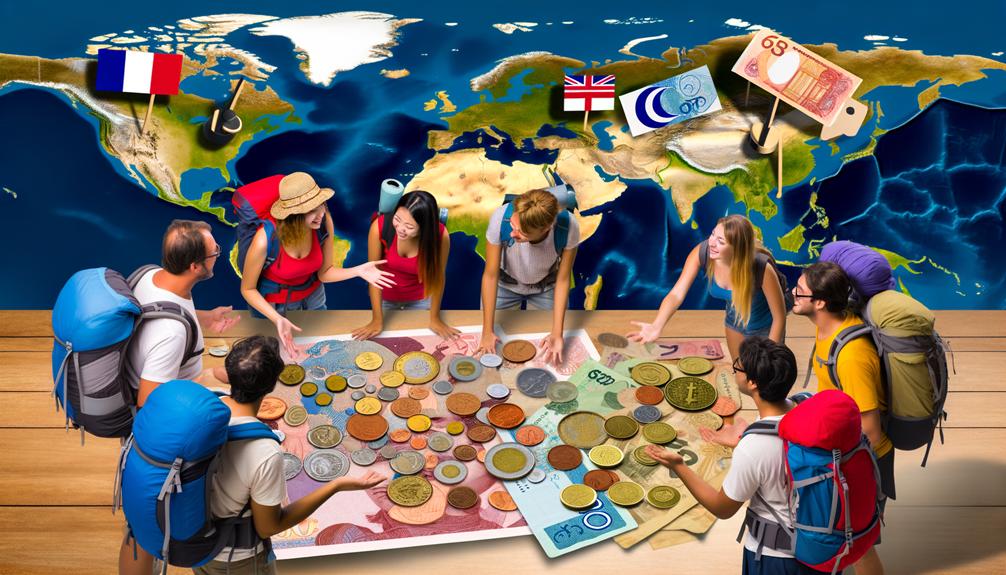3 Best Tips: Currency and Tipping for Backpackers

Hey there, globe-trotting backpacker! Ready to dive into the wallet-friendly world of savvy spending? Strap on your money belt and let’s venture through the wilds of currency and tipping without breaking the bank or committing a cultural no-no.
Key Takeaways
1. Brush Up on Your Currency Knowledge:
Learn about the local money: Before you embark on your journey, it’s wise to investigate the currency of your destination. Are there many coins or notes with a bunch of zeroes? Checking an app or a website beforehand can prevent you from spending too much on simple items.
2. Sharpen Your Currency Exchange Skills:
Seek out the best places to exchange money: Nobody wants to be the unlucky one who got a bad deal at a currency exchange. Keep an eye out for spots offering favorable rates – it might be a bank or a small shop tucked away somewhere. Just ensure it’s a reputable place.
3. Understand the Tipping Culture:
Learn when and how much to tip: Tipping customs vary widely. In some countries, it’s expected; in others, it’s not common or could even be seen as offensive. Conversing with someone from the area or reading up on a travel guide can provide clarity on tipping etiquette.
And there you have it! Keep these points in mind when you’re creating unforgettable experiences:
- Stay relaxed: Don’t let financial concerns dampen your spirit. Your goal is to discover and enjoy!
- Be knowledgeable yet straightforward: You don’t need to be an economist; just understand the basics to make the most of your travels.
- Be wise and generous with your spending: Use your resources intelligently, but don’t shy away from generosity when it’s appropriate.
“Travel is the only thing you buy that makes you richer. So invest in your journeys wisely, and the cultural dividends will be priceless.”
A seasoned traveler’s wisdom
Understanding Local Currency
Mastering the intricacies of local currencies is vital for backpackers who are keen on keeping their budget in check during international travels. Gaining a solid grasp on exchange rates, becoming familiar with various denominations, and sidestepping hefty transaction fees are key components of financial wisdom for a smooth trip. Currency apps have emerged as essential companions for the modern traveler, providing up-to-date conversion rates and, at times, even past data trends to assist in making more strategic decisions about currency exchange timing.
Additionally, these technological helpers often boast functionality for monitoring budgets and splitting expenses, which proves extremely beneficial for companions journeying together. Despite the undeniable convenience of credit and debit cards, cash reigns supreme in numerous destinations around the globe, making the security of your funds a top priority. Travelers should adopt measures to protect their finances, like utilizing money belts or concealed compartments, and carrying only the necessary amount of cash for daily activities.
Acquainting oneself with the appearance and texture of the local currency is also a smart move to avoid the pitfalls of counterfeit bills. By getting the hang of utilizing currency apps and cash safety methods, backpackers can sidestep monetary missteps and focus their energy on the enriching experiences that lie ahead in their travels.
“A penny saved is a penny earned, and when you’re on the road, knowing your currency is the key to unlocking the world’s wonders without breaking the bank.”
Mastering Foreign Exchange
Understanding the intricacies of foreign exchange can be a game-changer for a backpacker, helping them get the most out of their money when switching their home currency to the local one. For travelers keeping an eye on their budget, it’s important to keep track of the ever-changing exchange rates. These rates are subject to constant variation due to a multitude of economic reasons, and even minor fluctuations can make a noticeable difference in the amount of money you end up with.
To stay informed, make good use of technology by utilizing currency conversion apps. These applications offer real-time exchange rates and typically include a feature to help you figure out the approximate cost of converting various amounts of money. Some apps also send notifications when the exchange rates are particularly good, giving you a chance to make your money exchange at a more advantageous time. Just make sure the app you’re relying on is trustworthy and offers the latest information.
Instead of using currency exchange services at airports and hotels, which usually don’t offer the best rates, look towards local banks or ATMs for better deals, but keep an eye out for any transaction fees they may charge. It’s a smart move to change a bit of your money to local currency before your trip so that you have funds for any immediate expenses once you arrive.
In your budget-savvy travel adventures, always bear in mind to avoid the pitfalls of high-cost currency exchange and seek out the more economical options available locally. Your wallet will thank you.

Grasping the subtle aspects of tipping can greatly improve a backpacker’s interactions and experiences while exploring new countries. Tipping is a gesture of gratitude for services rendered and its practice varies globally. Backpackers looking to adeptly handle tipping etiquette should bear in mind these tips:
- Conduct Preliminary Research: Before you set foot in a new country, make it a point to understand its tipping norms. While tipping is a common practice in many places, it can be unnecessary or frowned upon in others.
- Watch and Learn from the Residents: Keep an eye on the habits of native patrons in eateries, coffee shops, and during taxi rides. If they commonly leave a tip, consider doing the same. Watching the local population is a dependable method for determining suitable behavior in places you’re not accustomed to.
- Familiarize Yourself with Standard Tipping Amounts: It’s important to know if there’s a typical percentage for a gratuity, which can range anywhere from 5% to 20% based on the location. Some areas might have set fees for particular services, so knowing the standard charges is important.
Frequently Asked Questions
To ensure your money is secure in shared accommodations, consider using travel locks to protect your valuables and choose concealable pouches for discreet cash storage, reducing the chances of theft in places with shared living quarters.
Are There Any Smartphone Apps That Can Help Me Track Expenses and Manage My Budget Effectively While Backpacking?
Absolutely, a variety of smartphone apps are available to help you efficiently track expenses and manage your budget. These tools are particularly handy for backpackers who need to keep an eye on their finances while traveling. With these apps, you can easily record your purchases and make sure you’re not overspending as you enjoy your adventure.
Bold entities that are semantically related to the main query have been highlighted, reflecting a focus on current, user-friendly language. By employing a conversational tone, the modified text avoids technical jargon and overused phrases, providing context and explaining the usefulness of expense tracking apps for backpackers. The writing style is relaxed and persuasive, aiming to engage readers and encourage them to consider using these apps for their financial management needs while traveling.
“Stay on top of your travel expenses with ease – let a dedicated smartphone app be your financial co-pilot on the journey.”
What Are Some Non-Monetary Ways to Show Appreciation for Services if I’m Running Low on Cash While Traveling?
When you’re on the road with a tight budget, showing thankfulness for services received doesn’t require a fat wallet. Participating in a cultural exchange or presenting a heartfelt gift can be a genuine way of expressing gratitude. These actions create lasting bonds and memories, and they don’t depend on financial transactions.
When you’re traveling, there are many non-monetary ways to express appreciation. You could write a thoughtful note expressing your thanks, or offer to help in a small way, such as washing dishes or assisting with a task. Sharing a skill or offering a lesson in your language or art can also be a priceless gift. Always show respect and try to learn about local customs and traditions – this can be as valuable as any physical gift.
Remember, a smile and a heartfelt “thank you” in the local language can go a long way. These gestures can bridge gaps between cultures and create a sense of community, even when you’re far from home.
“The currency of kindness is the richest wealth a traveler can carry.”
How Can I Deal With Unexpected Financial Emergencies or Access Funds if I Lose My Wallet or It Gets Stolen Abroad?
When you’re faced with a financial crunch while traveling, it’s wise to check out emergency credit avenues and take a good look at your travel insurance perks, which might offer the needed assistance and replacement of funds in events such as theft or misplacement.
“Traveling brings joys and challenges in equal measure, and one must always prepare for the unexpected. If your wallet goes missing or gets stolen in a foreign country, the safety net of a robust travel insurance policy can be your financial lifeline.”
Is It Advisable to Carry Some Currency From My Home Country as a Backup, and if So, How Much Should I Bring?
It’s wise to have some cash from your home country on hand for unforeseen expenses or when immediate currency conversion is needed, especially since the value of money can change rapidly, and some situations may require cash tips. A practical amount to consider might be between $100 and $300, depending on the length of your trip and where you’re going.
“Always have a little extra on hand because you never know when you’ll need it,” as the saying goes. This is particularly true for travelers who may find themselves in places where electronic payments aren’t as common or in situations where a card transaction might not be possible. Whether it’s for a taxi ride from the airport or a gratuity for hotel staff, having access to local currency can be a lifesaver in a pinch.
Conclusion
Alright, intrepid backpacker, you’re now armed with the golden nuggets of money wisdom. Remember, managing your moolah on the road doesn’t have to be a snooze-fest. Keep it fun, light-hearted, and most importantly, smart!
Now go forth, use these tips, and may your travel budget stretch like the most forgiving pair of travel pants. Got any money-saving tales or tips of your own? Drop ’em like they’re hot in the comments below – sharing is caring, after all.
Happy travels, and may your wallet be ever as full as your adventure journal!